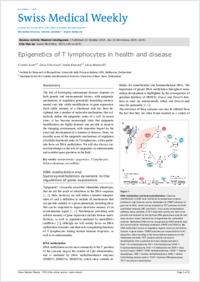Epigenetics of T lymphocytes in health and disease
- Leoni, Cristina Institute for Research in Biomedicine (IRB), Faculty of Biomedical Sciences, Università della Svizzera italiana, Switzerland - Graduate School for Cellular and Biomedical Sciences University of Bern, Bern, Switzerland
- Vincenzetti, Lucia Institute for Research in Biomedicine (IRB), Faculty of Biomedical Sciences, Università della Svizzera italiana, Switzerland
- Emming, Stefan Institute for Research in Biomedicine (IRB), Faculty of Biomedical Sciences, Università della Svizzera italiana, Switzerland - Graduate School for Cellular and Biomedical Sciences University of Bern, Bern, Switzerland
- Monticelli, Silvia Institute for Research in Biomedicine (IRB), Faculty of Biomedical Sciences, Università della Svizzera italiana, Switzerland
-
23.10.2015
Published in:
- Swiss Medical weekly. - 2015, vol. 145, p. w14191
English
The risk of developing autoimmune diseases depends on both genetic and environmental factors, with epigenetic mechanisms of regulation potentially translating environmental cues into stable modifications in gene expression. Such stable memory of a functional state has been deciphered into a number of molecular mechanisms that collectively define the epigenetic status of a cell. In recent years, it has become increasingly clear that epigenetic modifications are highly dynamic and are able to adapt to the changing environment, with important impact on the onset and development of a number of diseases. Here, we describe some of the epigenetic mechanisms of regulation of cellular functional states in T lymphocytes, with a particular focus on DNA methylation. We will also discuss current knowledge on the role of epigenetics in autoimmunity and consider open questions in the field.
- Language
-
- English
- Classification
- Medicine
- License
- Open access status
- diamond
- Identifiers
-
- RERO DOC 326873
- DOI 10.4414/smw.2015.14191
- ARK ark:/12658/srd1319095
- Persistent URL
- https://n2t.net/ark:/12658/srd1319095
Statistics
Document views: 203
File downloads:
- Texte intégral: 179
